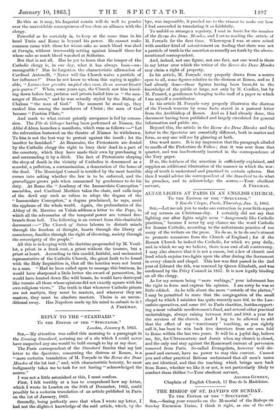REPLY TO THE "STANDARD."
To THE EDITOR OF' THE "SPECTATOR."
London, January 8, 1863.
SIR,—My attention was called this morning to a paragraph in the Evening Standard, accusing me of a sin which I could never have suspected any one would be bold enough to lay, at my door.
The Paris correspondent of the Standard fancies that my last letter to the Spectator, concerning the distress at Rouen, is a "mere verbatim translation of M. Forcade in the Revue des Deux Mondes of the 1st inst.," and, with characteristic honesty, he most indignantly takes me to task for not having "acknowledged the source."
I was not a little astonished at this, I must confess.
First, I felt terribly at a loss to comprehend how my letter, which I wrote in London on the 30th of December, 1862, could possibly be a verbatim translation of an article published in Paris on the 1st of January, 1863.
Secondly, being perfectly sure that when I wrote my letter, I had not the slightest knowledge of the said article, which, by the
bye, was impossible, it puzzled me to the utmost to make out how I had succeeded in translating it so faithfully.
To unfold so strange a mystery, I sent in haste for the number of the Revue des Deux Mondes, and I set to reading the article of M. Forcade for the first time. Whereupon I was at once seized with another kind of astonishment on finding that there was not a particle of truth in the assertion so roundly set forth by the above- mentioned correspondent.
And, indeed, not one figure, not one fact, not one word is there in my letter over which the writer of the Revue des Deux .Mondes may claim a right of property.
In his article, M. Forcade very properly draws from a source open to all, some figures relative to the distress at Rouen, and so I had already done—these figures having been brought to the knowledge of the public at large, not only by M. Cordier, but by M. Pessard, a gentleman belonging to the staff of a paper to which I am myself a contributor.
In his article M. Forcacle very properly illustrates the distress of the French weavers by some facts stated in a pastoral letter from the Archbishop of Rouen. And so I had already done, this document having been published and largely circulated for general information and public use.
Beyond this, the article in the Revue des Deux Mondes and the letter in the Spectator are essentially different, both in matter and form, as any one will see by glancing at both.
One word more. It is my impression that the paragraph alluded to smells of the Prefecture de Police ; that it was sent from that quarter, and was inadvertently inserted in the correspondence of the Tory paper.
If so, the boldness of the assertion is sufficiently explained, and supplies an additional illustration of the manner in which the wor- ship of truth is understood and practised in certain spheres. But then I would advice the correspondent of the Standard to do what he preaches, and to acknowledge the source.—Your obedient






























 Previous page
Previous page